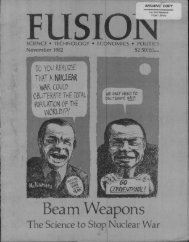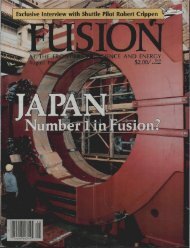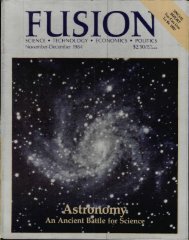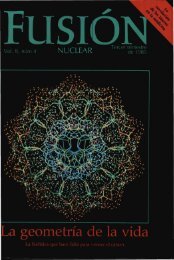preparing the minds of those who were to liveunder the laws for their reception, he refrainedfrom inventing myths himself or acquiescing inthose composed by others.... the world is inharmony with the Law, and the Law wi_h theworld, and that man who observes the Law isconstituted thereby a loyal citizen of the world,regulating his doings by the purposeand will ofNature.*8The establishment of the figure of Moses-Plato byPhilo opened the door to a revolutionary concept ofpolitical organization. At a stroke, the very definitionof what it meant to be a "Jew" had changed. A newand universal conception of Judaism that supersededthe old, tribal-racial notion had been born.For Philo, to be a Jew meant to subscribe to theMosaic (i.e., Platonic) law.Until Philo, Jewishness was defined in ratherprimitive tribal and racial terms. To be a Jew was tooriginate from the tribe or tribes that, as far back asthe Persian-Babylonian era, worshipped the Jewishtemple god Yahweh and obeyed the myriad laws andprecepts of the Old Testament prophets. There werefew instances of non-Jews converting to Judaism,which remained a closed family.Philo changed all that. He began by elaboratinga universal content for "Judaism." To Philo, unlike tothe Sadducees and Pharisees who controlled the Jerusalemtemple, it was not enough to be a Jew toguarantee holiness and "salvation." Apostates (Jewswho abandon their religion) were denounced byPhilo with the same venom as Jews who pretendedoutward piety but were hypocrites. Proselytes, who _,convert to Judaism, were eagerly welcomed by Philo Christ Preachingprovided they accept the law, because "they havethought fit to make the passage to piety." Philo evensuggested that there exists a class of Gentiles who, him as a "kook" and a mystic; most of them deny thathaving abandoned polytheism, subscribe to the law Philo, in fact, can even be considered Jewish! Theof nature even without formally becoming Jews. favorite portrayal of Philo by Oxford or CambridgeTheir circumcision, said Philo, foreshadowing St. classical scholars is that of a lonely, eclectic rabbi whoPaul, was spiritual, cutting off the pleasures of the had virtually abandoned Judaism--perhaps even besensesand the passions, come Christian who had fled from politics and theSuddenly, Judaism had been universalized. The civic life into abstruse speculative philosophy andtask of the Jewish humanists was now clear: Philo was erudite commentary on the scriptures.challenging them to assume responsibility for organ- Nothing could be further from the truth.izing the rest of the human race to the Neoplatonic Although he often stated his longing for the joysperspective laid out in Philo's work. Intrinsically, he of the contemplative life, Philo emphatically waswas challenging the perversion of Judaism into an political. He wrote:"ancient cult" restricted to the "land" of Palestineand the "Tribes of Israel" maintained by the evil high Truth would properly blame those who withoutpriests--chosen by Rome--to suit the conditions of examination abandon the transactions and busi-Roman rule.nessactivity of civic life.79To this day, Philo is bitterly denounced by bothZionist and British historians who attempt to dismiss And later:30 August 1980 / CAMPAIGNER
Mediterranean elite, and in the population at large, anew "nation"--universal in scope--would be bornwithin the decaying society of the Roman empire.The seed-crystal for an everlasting empire, foundedon Rome's ruins, was in place.The first partisans of Philo's movement wereknown as the "allegoricists," as opposed to the "literalists"that Philo was so fond of ridiculing. Decisively,Philo had split the Jewish community aroundhis idea. It is probable that the widely-traveled Philohad been to Jerusalem several times, and developedcollaborators there. The centrist idea of Jewish unityhad been demolished, and the cultist Jews were nowopposed by a faction demanding a humanist revolution.Philo contemptuously called the Pharisees, Sadducees,and their ilk "citizens of a petty state"-referring to their fanatical attachment to Jerusalem--while he described his faction as "those on the roll ofcitizens of a greater country, namely, this wholeworld."The term that Philo used to describe "this wholeworld" was megalopolis, the "one great city." ForPhilo, the entire universewas like a single city,governed by reason and natural law--the logos.Individualstates and kingdoms necessarily were merely asubordinate feature of this natural law, and theirauthority is thus derived nowhere but from God. Thiswas the Mosaic state who_e establishment was the taskof Philo's partisans, who must act to bring civilizationinto harmony with natural law. Philo drew upon theprevalent Messianic tradition of the Jews to suggestthat "salvation" would occur when a great teacherleaderwould emerge to found the Kingdom of God.But Philo was explicit about his belief that such aleader would also be prepared to wage politicalwarfare as well as epistemological debate, and thatthe Mosaic state, the just and true Republic, could beYou have ridiculed civic life (politeia),perhaps founded on earth as the symbol of human progress.because you have not realized how serviceable it This was Philo's conception of the Kingdom ofis. You should first exercise and train yourself in God. It embodied the Platonic axiom of Perfection.the private and public affairs of life, and becomeAt the time, the notion of perfection did not existyourselves politicians.... 20 as an active concept. The Roman elite was in the gripof the pseudo-intellectual Stoic tradition, whose dull-In the purest sense, the followers of Philo--like ing assumptions about a static and unchanging unithefollowers of Jesus Christ had formed a political verse were the hallmark of Roman political thought.party. With them, Philo had created an entirely new Philo's revolutionary view of political history is bestconcept of nationality. For the first time, the idea of highlighted in comparison with that of the famousa "nation" was based on the adherence of its citizens stoic historian Polybius, writing in the second centuryto a system of ideas. No longer was nationality based before Christ. According to Polybius, history--espeonterritory or race or tribe, but on a brotherhood of cially political history---operates in cycles. The risecommon belief. The Idea of Humanism, as presented and fall of great empires, evident throughout history,by the pre-Socratic Ionian philosophers, systematized was to Polybius just a sign that whatever man couldby Plato, and elaborated by Philo, forged the corn- raise up would be eventually destroyed and turned tomon bond for the citizens of the "Kingdom of God." ruins. Small states could become great; great statesAs that notion took root in ever broader circles in the could pass through evolutionary changes from mon-CAMPAIGNER / August 1980 31
- Page 8 and 9: Behind theMiami Riotsby Felice Merr
- Page 11 and 12: 1. Policy-making: the Trila- their
- Page 13 and 14: _•_• •_• convention, was al
- Page 15 and 16: FEMA's vision of thefuture: a racia
- Page 17 and 18: Janet Reno completely bungled and f
- Page 19 and 20: IntroductionFor we wrestle not agai
- Page 21 and 22: esponding to his message, Philo ass
- Page 23 and 24: The enemy of the Christians was ind
- Page 25 and 26: ing of Rome itself, lasted hundreds
- Page 27 and 28: notions about the gods and views on
- Page 29 and 30: people who live in cities do not kn
- Page 31: prevailing bestiality would have to
- Page 35 and 36: self-denial and a disassociation of
- Page 37 and 38: wearily strive, but from which they
- Page 39 and 40: itself as many sensible classes of
- Page 41 and 42: altered or forged. The existence an
- Page 43 and 44: Certainly,Jesus entered Jewish soci
- Page 45 and 46: commitment to that ideal against we
- Page 47 and 48: Christ Presented to the People by P
- Page 49 and 50: cast into his garden, and it grew a
- Page 51 and 52: uilt the Christian movement was a b
- Page 53 and 54: pagan cults to bore inside the move
- Page 55 and 56: despite their inhuman behavior--whi
- Page 57 and 58: early gnostic text, Thunder, Perfec
- Page 59 and 60: And said, "O full of all subtlety a
- Page 61 and 62: • Rome• M A C ED O N IA "_i_::i
- Page 63 and 64: the level spaces. Then it climbed t
- Page 65 and 66: latter half of the second century,
- Page 67 and 68: great many people could be reformed
- Page 69 and 70: And upon her forehead was a name wr
- Page 71 and 72: 60 A.D. PAUL's Roman imprisonmenL a
- Page 73 and 74: The drugplagueis onlypartof tile st
- Page 75 and 76: severalanti-Falk letters, not just
- Page 77 and 78: BOOKSWhy the Green Nigger,Re-mythin
- Page 79 and 80: pathy, clairvoyanCe,*:;_'_%cogni- d
- Page 81 and 82: netarist school of economics beat a
- Page 83 and 84:
illegal seizure of property rights)
- Page 85 and 86:
of Cardinal Nicholas of Cusa as obl
- Page 87 and 88:
I.mERSiThis criticism of Carter is
- Page 89 and 90:
several years in England as the yea

















